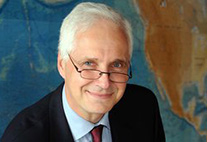GeoUnion’s Johannes-Georgi-Preis 2016 is awarded to Martin Claussen
14 March 2016, by CEN Universität Hamburg

Photo:
The renowned Johannes Georgi Award for Meteorology 2016 goes to Martin Claussen, Professor of Meteorology at Hamburg University and Director at the Max Planck ...
The renowned Johannes Georgi Award for Meteorology 2016 goes to Martin Claussen, Professor of Meteorology at Hamburg University and Director at the Max Planck Institute for Meteorology, Hamburg. The prize has been presented to Prof. Claussen during the opening session of the meteorological conference 'DACH 2016', jointly hosted by Deutsche Meteorologische Gesellschaft (DMG), Österreichische Gesellschaft für Meteorologie (ÖGM) and Schweizerische Gesellschaft für Meteorologie (SGM), at Freie Universität Berlin on Monday, 14th March 2016. The award was handed over to the laureate by Mrs. Gudrun Rosenhagen, president of the DMG.
The prize is awarded to scientists with a special focus on the Atmospheric Sciences. The prize money is currently at 2,500 Euro, financed from a donation by the German meteorologist Johannes Georgi (1888-1972).
Martin Claussen has been chosen as prize winner for 2016 on account of his excellent and innovative work on the interdependencies of climate and vegetation dynamics, especially with regard to the changes of forests and dry lands on earth. In his appraisal of the laureate Professor Clemens Simmer of Bonn University underlines: "Martin Claussen has issued a series of fundamental and most innovative contributions on climate dynamics which have made a substantial impact on our present-day discussion on climate change. Using new ways of ecosystem modeling in combination with climate models and field observations, Claussen has been able to show how vegetation patterns on the one hand and climate on the other hand have had mutual impacts upon each other in recent earth history; for instance, vegetation effects have reinforced climate fluctuations determined by variations in the earth's orbit, while biodiversity was able to reduce the vulnerability of ecosystems under the conditions of gradual climate change".
Martin Claussen was born in Fockbek (Schleswig-Holstein) in 1955. He studied at Hamburg University, where he also received his PhD (in 1984) and his habilitation (in 1991). After a research period stay at Massachusetts Institute of Technology in Cambridge, USA, he continued his career at Hamburg's Max Planck Institute for Meteorology and at the GKSS Research Centre in Geesthacht. From 1996 he taught at Freie Universität Berlin and Potsdam University and worked at the Potsdam Institute for Climate Impact Research, finally as its Managing Director. In 2005 Martin Claussen returned to Hamburg to become Professor of Meteorology at Hamburg University and Director of the Max Planck Institute for Meteorology. His scientific works includes more than 100 refereed publications.
Press release by GeoUnion Alfred-Wegener-Stiftung
More information
